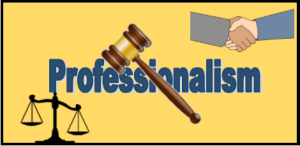Professionalism: It Protects and It Pays!
 You’ve worked hard and invested much time and energy to earn your law degree.
You’ve worked hard and invested much time and energy to earn your law degree.
Protect it by placing it in a golden frame of professionalism.
Begin by understanding the difference between professionalism and ethics. Ethics are the codified rules that establish a boundary between appropriate and inappropriate behavior in given circumstances. Cross this line and trouble awaits. In North Carolina, the Rules of Professional Conduct are found in Title 27 of the North Carolina Administrative Code and are available through the State Bar at its website (www.ncbar.com) and the Lawyers Handbook.
Professionalism, on the other hand, is a broader and more amorphous concept.
Wharton defines professionalism as “a code of honor mutually agreed on by mutual understanding and tacitly accepted by members of the legal profession.” Note the words “mutual understanding” and “tacitly accepted.” These phrases suggest that standards of professionalism aren’t etched in stone and can change over time.
Back in the day, for instance, almost every lawyer showed up for work almost every day in business attire. Today, casual days are the norm.
In fact, the ethics rules recognize the larger context of professionalism. “The Rules do not … exhaust the moral and ethical considerations that should inform a lawyer, for no worthwhile human activity can be completely defined by legal rules,” according to Section 0.2.
Following are some tips for building your career on the bedrock of professionalism.
- Join the North Carolina Bar Association. Unlike the mandatory State Bar, the NCBA is a voluntary organization dedicated to improving the practice of law, providing continuing legal education, and serving its members through social activities. The NCBA emphasizes outreach for new lawyers. Sign up, join a committee, or attend the annual meeting this summer.
- Join your local bar groups. In addition to judicial district bars, many cities and counties have voluntary local bar organizations. Some of these are structured, with dues and regular meetings, while others are no more formal than a group of regulars who convene every morning at the coffee shop across from the courthouse. Show up at the next gathering. Ask someone to introduce you to the group. Bring your business cards and spread the word on who you are and what you do.
- Treat others as you want to be treated. This applies equally to clients, colleagues, court clerks, and the copy guy at Kinko’s.
- Be positive. Practicing law can be grim work. Some clients are difficult and some cases are downers. Smile anyway. Projecting a positive outlook can turn lemons into lemonade.
- Find a mentor. In Greek mythology, Mentor was a sage adviser who encouraged Odysseus to go forth and find his destiny. Every district has a handful of lawyers who are universally held in high esteem. Seek these people out. Give them a call, take them to lunch, or shadow them as they go through their day. Like the original Mentor, they will be flattered and delighted to assist you on your quest.
- Don’t procrastinate. Lawyers who do their work promptly and on time will enjoy a long and prosperous career. A huge percentage of State Bar grievances and malpractice claims arise not because the lawyer was incompetent but simply because the promised work wasn’t delivered on time. According to the Rules, “No professional shortcoming is more resented by clients” than procrastination.
- Obtain malpractice insurance. They don’t call it professional liability coverage for nothing.
- Ask for help. Law school can be an isolating experience. You are competing with colleagues for clerkships and class rank, and you are expected to have the answers at exam time. In the real world, though, nobody knows it all. Don’t feel you have to. Watch out for signs of stress, fatigue or disabling anxiety. Talk to someone. Good lawyers will want to help. To them, you are not a competitor, but a new member of a special and storied profession.
- Be alert for teachable moments. Take notes when good lawyers and judges do good things. Attend CLEs on professionalism and quality of life. Get in touch with the Chief Justice’s Commission on Professionalism, which provides “attention and assistance to ensure the practice of law remains a high calling, dedicated to the service of clients and the public good.”
- Focus on service. When he was a backwoods lawyer, Abraham Lincoln said helping clients work through problems was a sure cure for despondency and self-pity. Getting paid for that service was gravy.
- Get a copy of the Lawyer’s Professionalism Creed. You can find it at www.nccourts.org/Courts/CRS/Councils/Professionalism. Read it. Better yet, post a copy in your office.
- Go placidly amid the noise and haste. Remember what peace there may be in silence. Strive to be happy.


